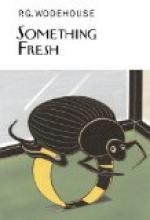Not once since the removal of the scarab had begun to exercise his mind had Mr. Peters contemplated for an instant the possibility of recovering it himself. The prospect of the unpleasantness that would ensue had been enough to make him regard such an action as out of the question. The risk was too great to be considered for a moment; but here he was, in a position where the risk was negligible!
Like Ashe, he had always visualized the recovery of his scarab as a thing of the small hours, a daring act to be performed when sleep held the castle in its grip. That an opportunity would be presented to him of walking in quite calmly and walking out again with the Cheops in his pocket, had never occurred to him as a possibility.
Yet now this chance was presenting itself in all its simplicity, and all he had to do was to grasp it. The door of the museum was not even closed. He could see from where he stood that it was ajar.
He moved cautiously in its direction—not in a straight line as one going to a museum, but circuitously as one strolling without an aim. From time to time he glanced over his shoulder. He reached the door, hesitated, and passed it. He turned, reached the door again—and again passed it. He stood for a moment darting his eyes about the hall; then, in a burst of resolution, he dashed for the door and shot in like a rabbit.
At the same moment the Efficient Baxter, who, from the shelter of a pillar on the gallery that ran around two-thirds of the hall, had been eyeing the peculiar movements of the distinguished guest with considerable interest for some minutes, began to descend the stairs.
Rupert Baxter, the Earl of Emsworth’s indefatigable private secretary, was one of those men whose chief characteristic is a vague suspicion of their fellow human beings. He did not suspect them of this or that definite crime; he simply suspected them. He prowled through life as we are told the hosts of Midian prowled.
His powers in this respect were well-known at Blandings Castle. The Earl of Emsworth said: “Baxter is invaluable—positively invaluable.” The Honorable Freddie said: “A chappie can’t take a step in this bally house without stumbling over that damn feller, Baxter!” The manservant and the maidservant within the gates, like Miss Willoughby, employing that crisp gift for characterization which is the property of the English lower orders, described him as a Nosy Parker.
Peering over the railing of the balcony and observing the curious movements of Mr. Peters, who, as a matter of fact, while making up his mind to approach the door, had been backing and filling about the hall in a quaint serpentine manner like a man trying to invent a new variety of the tango, the Efficient Baxter had found himself in some way—why, he did not know—of what, he could not say—but in some nebulous way, suspicious.
He had not definitely accused Mr. Peters in his mind of any specific tort or malfeasance. He had merely felt that something fishy was toward. He had a sixth sense in such matters.




